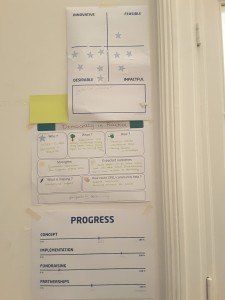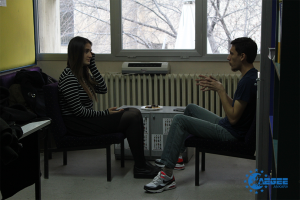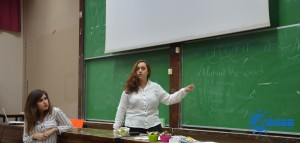Right after EPM Leiden, members of Democracy in Practice gathered in Brussels to finalise content restructuring, designed to bring the project closer to locals and to expand communication channels. The team now hails from eight different countries.
Team members were attracted to the project for several reasons: after observing the low turnout at European Parliament elections and low youth civic participation in general; the lack of respect for fundamental human rights, including gender equality, in their own countries; and to understand comparatively what makes up a true democracy – to name a few. Several members have a legal and political background. Other specialisations include economics, computer science, languages, engineering and naval architecture. With such a diverse range in knowledge, skills and approaches, but a shared passion for upholding human rights and democracy, the nature of the project can uniquely be described as part social and political science, part humanitarianism, part art, but democratic decision making all the way.
A pillar of the project is informal education. Given their previous success at EPMs, Agorae and Network Meetings, more emphasis is being placed on developing interactive workshops. Through these, the project explores the nature of human rights and democracy by simulating events that most of us, in some cases fortunately, will likely never experience in real life. What was democracy like in ancient Greece? What is it like to work as an immigration official? As a newspaper editor, how easy is it to represent the news honestly and objectively? After a re-enactment by participants, the DIP workshop facilitator conducts a debriefing, in which the underlying meaning and implications of the exercise come to light. It may remind you of a psychological experiment, however, the workshops are exploratory and the facilitator is on an equal footing with the participants and does not impose a predetermined outcome. As a result, the experience is also enlightening for the facilitator, who always learns something new.
How about locals, who want to bring such workshops to their local group, or to add a human rights and democratic dimension to a specific topic, perhaps of interest to their region, but lack experience, time or resources to do so? The team agreed a simple collaboration strategy, to enable locals, with minimum hassle, to fit DIP activities into European events, Summer Universities, or simply as a standalone event of up to a few days. There is also potential for DIP’s growing database of external collaborators across Europe, to provide talks, workshops and expertise during these events. A selection of standard DIP activities are on offer, combining some or all of workshops, debates, roundtable discussions, flash-mobs and talks, but more flexible collaborations are encouraged. Following a skype meeting with a local, DIP would be able to tailor activities to specific topics, timeframes, levels of difficulty, interactivity and fun, and to promote the event. The local then only needsto provide a location for activities, accommodation and food for participants.
On the final day of the meeting, DIP was fortunate in being able to take part in the Citizens for Europe project fair in Brussels, and as a result forged new connections with other projects that promote democratic participation, in the fair’s principle of putting cooperation above competition. The process was also very much an educational tool in project evaluation and gave DIP an outsider’s perspective of the project. It opened with an elevator pitch of each project. Representatives then showed on a scale of 0 to 100 how far developed their project was in concept, execution, funding and collaborations, and stated their project’s strengths and weaknesses, and how it could benefit from and assist other projects. After more detailed discussions on these points, the fair’s participants assimilated and analysed this information, as they compared projects and cast votes in four categories – innovation, feasibility, desirability and impact. Only at this point, contact details and business cards were exchanged.
Democracy in Practice now strives to become a go to within the AEGEE network for the latest important human rights and democracy news and debates, and will be posting weekly articles on facebook, as well as Twitter and Instagram posts. Social networkers considering becoming more involved in DIP’s activities, or in search of inspiration for their local, can also tune in for photos and stories of past as well as future events and competitions. The democratic, interdisciplinary and exploratory nature of the project means members are very much open to suggestions and nothing is too out of the box – in fact, DIP recently ran a photo competition, and has a large human rights playlist and database of human rights themed movies. So do contact DIP with your ideas, or to send a cool picture of your own human rights themed activity. The project is also looking for new members, particularly men, so if you like what you have seen so far, DIP would love to hear from you.




